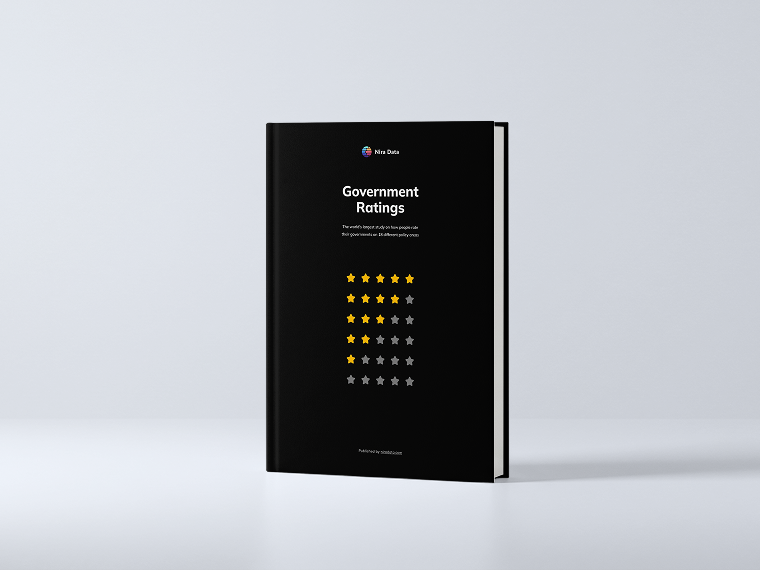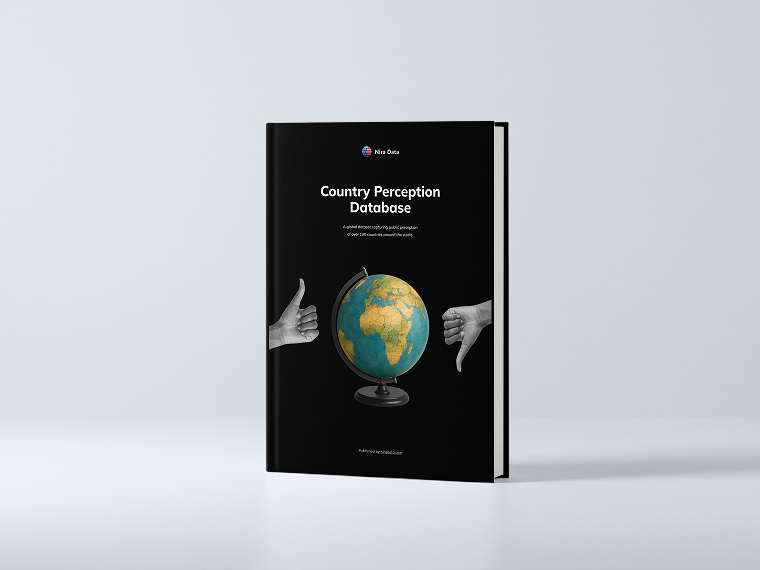Government Ratings
Largest global opinion study on public perception of security and defense in a changing world
This report tracks how people rate their governments’ work in different policy areas, ranging from the cost of living, to education and health systems, security and defense, macroeconomic management, public infrastructure, the environment and many more. The report also tracks both personal economic outlooks in different countries as well as assessments of the overall direction that a country is following.
Key Findings
- Ranking of personal economic outlook
- Ranking of country direction
- Public confidence in the ability of governments—democratic or otherwise—to deliver effective results is very low. Across 18 policy areas, people globally gave their governments low marks, with an average score of just 2.77 out of 5.
- Since they are very context specific, perception ratings are difficult to compare across countries at different levels of income, security environments etc., so cross country comparisons are limited to countries with similar macroeconomic and societal conditions, for example across OECD countries.
- Citizens are particularly dissatisfied with government performance on the cost of living, poverty reduction, and affordable housing—issues that directly impact their daily lives. The widespread perception of underperformance highlights a growing gap between democratic ideals and the practical outcomes many citizens expect but feel are not being met.
- Among OECD countries, the country that is perceived by its citizens to be most well-run is Denmark, followed by Switzerland and Norway. At the bottom of the ranking is Hungary, Turkey and the UK.
Key Findings
- The 2025 DPI reveals a complex global sentiment towards democracy. While 70% of respondents affirmed the importance of democracy, only 58% expressed satisfaction with its current state in their countries. This dissatisfaction is evident even in nations with strong democratic traditions, such as the United States and several European countries.
- The DPI also highlights regional disparities in democratic satisfaction. In the European Union, for instance, while a majority of citizens consider their countries democratic, significant portions of the populations in France, Greece, and Hungary believe they no longer live in free democracies. Globally, the perception of the United States as a democratic model is waning, particularly in Muslim-majority countries, where America's popularity as a global power has declined.
- Despite these challenges, the DPI indicates that democracy remains the preferred system of governance for a vast majority of the global population. This enduring support suggests a resilience in democratic ideals, even as institutions face mounting pressures. The report underscores the need for democratic governments to address public dissatisfaction by enhancing transparency, accountability, and inclusivity in governance.
- In conclusion, the 2024 Democracy Perception Index paints a picture of a world at a democratic crossroads. While the foundational support for democracy remains robust, there is a clear and pressing demand for reforms that address the systemic issues undermining public trust. The path forward requires concerted efforts from governments, civil society, and international organizations to revitalize democratic institutions and processes.
- 140 page report with in-depth data on each country
- Raw data for 100 countries in xls format (not respondent level) and 18 policy areas
- Demographics and segmentations:
- Age (18-35, 36-55, 56+)
- Gender (Male, Female)
- Income (High, mid, low)
- Education (High, mid, low)
- Employment status (Employed, unemployed/not working by choice)
- Ethnic minority (Yes, no)
- Large city/suburban/rural
- Algeria
- Angola
- Argentina
- Australia
- Austria
- Bangladesh
- Belarus
- Belgium
- Bolivia
- Brazil
- Cameroon
- Canada
- Chile
- China
- Colombia
- Costa Rica
- Democratic Republic of the Congo
- Denmark
- Dominican Republic (the)
- Ecuador
- Egypt
- El Salvador
- Ethiopia
- Finland
- France
- Georgia
- Germany
- Ghana
- Greece
- Guatemala
- Honduras
- Hungary
- India
- Indonesia
- Iran
- Iraq
- Ireland
- Israel
- Italy
- Ivory Coast
- Jamaica,
- Japan
- Jordan
- Kazakhstan
- Kenya
- Kuwait
- Kyrgyzstan
- Lebanon
- Libya
- Lithuania
- Malaysia
- Mexico
- Moldova
- Morocco
- Mozambique
- Namibia
- Netherlands
- New Zealand
- Nicaragua
- Nigeria
- Norway
- Oman
- Pakistan
- Palestine
- Panama
- Paraguay
- Peru
- Philippines
- Poland
- Portugal
- Puerto Rico (US)
- Romania
- Russia
- Saudi Arabia
- Senegal
- Serbia
- Singapore
- South Africa
- South Korea
- Spain
- Sri Lanka
- Sweden
- Switzerland
- Taiwan
- Tanzania
- Thailand
- Tunisia
- Turkey
- Uganda
- Ukraine
- United Arab Emirates
- United Kingdom
- United States
- Uruguay
- Uzbekistan
- Venezuela
- Vietnam
- Yemen
- Zambia
- Zimbabwe
- Ensuring low inflation and stable costs of living
- Promoting job creation and reducing unemployment
- Managing national debt and public spending
- Providing and maintaining public infrastructure (roads, electricity, water supply)
- Providing a high quality public education system
- Increasing public safety and preventing crime
- Reducing poverty and improving living standards
- Promoting economic growth
- Reducing discrimination and protecting minority rights
- Protecting the environment and managing climate change risks
- Ensuring an efficient public administration
- Promoting innovation and the adoption of new technologies
- Ensuring access to affordable housing
- Ensuring access to affordable healthcare
- Ensuring gender equality and promoting women's rights
- Managing refugees and international migration
- Providing security against war and external aggression
- Fighting terrorism and extremism
Buy main report and single country deep-dive
EUR 90.00 per report
Select your country
Buy main report and all 100 country deep dives
Government Ratings
EUR 7,900.00




